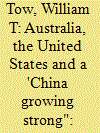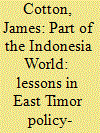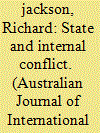| Srl | Item |
| 1 |
ID:
019773


|
|
|
|
|
| Publication |
April 2001.
|
| Description |
55-63
|
| Summary/Abstract |
The inter-Korean summit held in Pyongyang between 13 and 15 June 2000 was an unprecedented event. It was the first time the leaders of North and South have met face to face since the formal partitioning of Korea in 1948. This article examines the main reasons why the 2000 summit occurred, what the summit produced, and its implications for inter-Korean relations in the early part of the 21st century. Although the summit could well be an important step towards breaking down the long-standing barriers of suspicion and mistrust between Pyongyang and Seoul, it is premature to conclude (as some observers have) that the summit has heightened the prospects for reunification on the Korean peninsula. Instead of grandly portraying the 2000 summit as heralding a transition to reunification, it is far more accurate to view it as a positive step towards the more modest objective of longer-term reconciliation between the two Koreas.
|
|
|
|
|
|
|
|
|
|
|
|
|
|
|
|
| 2 |
ID:
019778


|
|
|
|
|
| Publication |
April 2001.
|
| Description |
133-143
|
|
|
|
|
|
|
|
|
|
|
|
|
|
|
|
| 3 |
ID:
019772


|
|
|
|
|
| Publication |
April 2001.
|
| Description |
37-54
|
| Summary/Abstract |
How to deal with a rising China constitutes one of the most seminal challenges facing the ANZUS alliance since its inception a half a century ago. Australia must reconcile its geography and economic interests in Asia with its post-war strategic and historic cultural orientation towards the United States. It must succeed in this policy task without alienating either Beijing or Washington in the process. The extent to which this is achieved will shape Australia's national security posture for decades to come.
Three specific components of the 'Sino-American-Australian' triangle are assessed here: the future of Taiwan, the American development of a National Missile Defence (NMD), and the interplay between Sino-American power balancing and multilateral security politics. The policy stakes for Australia and for the continued viability of ANZUS are high in all three policy areas as a new US Administration takes office in early 2001. The article concludes that Australia's best interest is served by applying deliberate modes of decision-making in its own relations with both China and the US and by facilitating consistent and systematic dialogue and consultations with both of those great powers on key strategic issues.
|
|
|
|
|
|
|
|
|
|
|
|
|
|
|
|
| 4 |
ID:
019776


|
|
|
|
|
| Publication |
April 2001.
|
| Description |
101-117
|
| Summary/Abstract |
A manifestation of the anti-colonialist sentiment in Malaya and Singapore during the post-war period of decolonisation was the vociferous protest against the White Australia Policy. Australia's restrictive immigration policy was seen as an offensive colour bar, similar to the various racial restrictions that British authorities placed on their colonial subjects, which symbolised white dominance. By protesting against the White Australia Policy, the colonial subjects of the British in Malaya and Singapore were indirectly attacking white colonial rule in Southeast Asia. Antagonism towards the White Australia Policy became less vocal as Malaya and Singapore proceeded towards self-government and independence, when many of the colonial colour bars were removed. However, low-key resentment against what was seen as a symbol of white colonialism still persisted in relations with Australia.
|
|
|
|
|
|
|
|
|
|
|
|
|
|
|
|
| 5 |
ID:
019770


|
|
|
|
|
| Publication |
April 2001.
|
| Description |
21-28
|
|
|
|
|
|
|
|
|
|
|
|
|
|
|
|
| 6 |
ID:
019771


|
|
|
|
|
| Publication |
April 2001.
|
| Description |
29-36
|
|
|
|
|
|
|
|
|
|
|
|
|
|
|
|
| 7 |
ID:
019777


|
|
|
|
|
| Publication |
April 2001.
|
| Description |
119-131
|
|
|
|
|
|
|
|
|
|
|
|
|
|
|
|
| 8 |
ID:
019769


|
|
|
|
|
| Publication |
April 2001.
|
| Description |
7-20
|
|
|
|
|
|
|
|
|
|
|
|
|
|
|
|
| 9 |
ID:
019775


|
|
|
|
|
| Publication |
April 2001.
|
| Description |
83-100
|
| Summary/Abstract |
On 27 June 2000, the Howard Government released a public information paper on defence which set in train a process of public consultation in which the people's views were sought on a range of defence and defence-related issues. This paper examines why the Government chose to go to the people, how and by whom the community consultation was conducted, who was consulted and listened to, and how what was heard at the public meetings component of the process was both interpreted and reported. The paper concludes that the public consultation process was more about politics than policy; it is inappropriate for the Government to claim or imply that it has heard from the 'Australian people' or even 'the majority of the community' on the issues raised; and the consultation process and its outcomes are not entirely risk-free for the Government and the defence establishment.
|
|
|
|
|
|
|
|
|
|
|
|
|
|
|
|
| 10 |
ID:
019774


|
|
|
|
|
| Publication |
April 2001.
|
| Description |
65-81
|
| Summary/Abstract |
Research into the causes of contemporary international conflict faces a number of conceptual limitations, which in turn limits the effectiveness of international conflict resolution efforts. Typically, today's internal conflicts are conceived of as irrational outbursts of 'ethnic' hatred, or the breakdown of normally peaceful political systems. In this paper, I argue that the causes of internal conflicts are, in fact, located in the structures of weak states and the actions of weak state elites, who may deliberately engender conflict as a rational response to the internal and external demands brought on by the intrusive processes of globalisation. In this sense, internal conflict is a 'normal' aspect of weak state politics. The weak state framework not only provides a more satisfying explanation of internal conflict, but it has profound implications for conflict resolution. It suggests that conflict resolution must be focused on state reconstruction activities, rather than on saving failing states. It also suggests that there are likely to be many more internal conflicts which demand international action in the future.
|
|
|
|
|
|
|
|
|
|
|
|
|
|
|
|